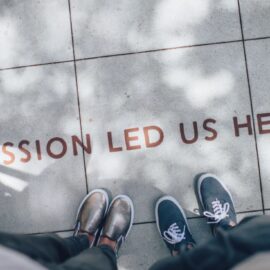
What are the downsides of creative success? How can you find a middle ground between staying confident and being humble?
Questlove, musician, producer, and author of Creative Quest, explores the successes and failures that come with creativity. He writes that there’s a lot to learn from each and that creative success can come with some downsides.
Keep reading to learn how to handle creative successes and failures.
How to Navigate Success and Failure
Questlove writes that every creative person will face both praise and criticism. When people praise your work, it’s easy to feel pressure to keep making things that are just as good or better. When people criticize your work, it’s easy to feel discouraged and want to give up. The key is to find a middle ground: Stay confident enough to keep creating, but humble enough to learn from feedback.
How to Navigate Success
Questlove points out that creative success can be just as challenging to deal with as failure and criticism. When artists gain recognition for a certain style or quality, fans expect them to keep making the same kind of work. This pressure can stop artists from trying new things or growing creatively. Questlove says artists need to be brave enough to disappoint some fans by changing their style if they want to keep growing as creators.
To deal with creative fears—whether of failing or disappointing fans—remember you’re a small part of a larger creative community. Don’t preoccupy yourself with achieving immediate success and instead, focus on getting better at your craft over time. When you focus on gradual improvement rather than instant perfection, you’ll find it’s easier to express yourself creatively.
| Avoid the Ego Traps That Come With Success Questlove focuses on how success can make you afraid to take creative risks, but according to other authors, that isn’t the only challenge that comes with success. In Ego Is the Enemy, Ryan Holiday argues that success can inflate your ego, which can sabotage everything you’ve worked for if you’re not careful. He writes that ego enhances three feelings that can derail your success: 1. Entitlement: Success can make you believe you deserve certain rewards or recognition and feel resentful when you don’t get them. This can lead people to be less willing to help you toward your goals. 2. Paranoia: When you achieve success, your ego can drive you to obsess over proving doubters wrong, causing you to see enemies everywhere, even when they don’t exist. 3. Control: An excessive need for control can turn you into a perfectionist who fights pointless battles over minor issues, ultimately making both you and those around you miserable. Like Questlove, Holiday urges you to maintain your perspective to resist these traps. Remember that you aren’t entitled to anything you don’t already have and that you aren’t the center of the world. Think about how you fit into the world, as this keeps you grounded and focused on your purpose. |
How to Cope With Failure
Questlove acknowledges that getting your work rejected or criticized can hurt, but he urges you to treat failure like a lesson that helps you grow. He points out that even famous artists faced failures and rejection in their careers. Each time you bounce back from a failure, you become stronger and more willing to try new things in your next project. Once you’ve experienced failure and survived it, you realize it’s not as scary as you imagined. As a result, you become less afraid to try bold ideas because you know that failure won’t destroy you—it just becomes another learning experience.
(Shortform note: In Big Magic, Elizabeth Gilbert suggests you treat failure like a lesson by reframing all creative setbacks as simply “interesting” instead of good or bad. Judging your work as either “good” or “bad” can lead you to give up too quickly, but viewing failure as “interesting” keeps you moving forward and growing. You naturally become curious about what worked, what didn’t, and how you can improve next time instead of beating yourself up over mistakes.)
Additionally, Questlove writes that while it’s important to learn from failure and criticism, you shouldn’t blindly accept every piece of feedback you receive. In today’s digitally connected world, everyone can share their opinion instantly online. Taking every comment seriously can paralyze your creativity and stop you from making the art you want to make.
Questlove encourages you to thoughtfully filter and contextualize the feedback you receive. He explains that every piece of feedback is made under certain conditions, with varying levels of effort and expertise. Adjust how seriously you take feedback based on these factors. For example, a thoughtful review from an experienced critic deserves more attention than a hasty online comment.
| How to Solicit Helpful Feedback Questlove provides advice for evaluating the feedback that comes your way, but he doesn’t explain how to solicit feedback in the first place. In Decoding Greatness, Ron Friedman provides tips for actively requesting helpful feedback. He advises, asking specific questions, explaining that vague requests like “What do you think?” usually lead to unhelpful responses like “I liked it” or “I didn’t like it.” Instead, ask targeted questions about particular aspects of your work, such as “Does the third verse make the song too long?” This helps reviewers give you concrete, actionable suggestions rather than general opinions. Friedman adds that managing your emotional response to criticism is crucial for growth. First, create some emotional distance from your work before seeking feedback. When you’re too close to your work, criticism can feel like a personal attack, making it hard to process feedback objectively. Second, when you receive harsh critiques, take time to process your feelings before making any changes to your work. This prevents you from making hasty revisions that might not serve your creative vision. |






